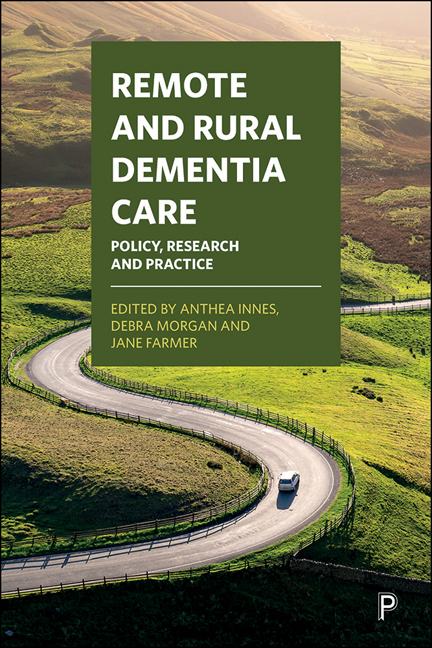5 - Rural Dementia Research in Canada
Published online by Cambridge University Press: 10 March 2021
Summary
Introduction
Canada, like other countries around the world, has an ageing population and growing numbers of people with dementia. Although rural Canada makes up 95 per cent of the country's land mass (Moazzami, 2014), Canada is becoming increasingly urbanised as cities grow and the proportion of people living in rural areas has declined and aged (Statistics Canada, 2017a). These changes have socioeconomic impacts on rural communities, including ability to deliver health and social services for ageing rural populations. The challenges of ageing in rural communities, such as disparities in access to services (Keating et al, 2011) are compounded when living with dementia. This chapter reviews the Canadian dementia care context, issues and challenges in rural dementia care, and Canadian research addressing these issues. The chapter provides an overview of the Rural Dementia Action Research (RaDAR) programme based in Saskatchewan, Canada, which has focused on rural dementia care for over 20 years.
Dementia in Canada
The number of people over age 65 in Canada is projected to increase from 17 per cent in 2017 to 23 per cent by 2031 (Statistics Canada, 2017a). The number of people with dementia is also projected to increase, from 564,000 in 2016 to around one million by 2033 (ASC, 2016). A number of Canadian initiatives have been implemented to address growing dementia care needs. Most of the ten provinces in Canada have established dementia strategies, some as early as 2002, and a national dementia strategy was released in 2019 (Public Health Agency of Canada). A 2016 report by the Senate of Canada included 29 recommendations to inform development of the national strategy (Senate of Canada, 2016). The Alzheimer Society of Canada has published several studies of projected prevalence and monetary costs using different data sources and intervention scenarios (ASC, 2010, 2016). The Canadian Institutes of Health Research Dementia Research Strategy included C$32 million in federal funding over five years for Phase I of the Canadian Consortium on Neurodegeneration in Aging (CCNA) and C$46 million for Phase 2 (2019– 24). This network of 20 research teams involves over 350 researchers conducting research in dementia prevention, treatment and quality of life (CCNA, 2019). The Canadian Chronic Disease Surveillance System was expanded to include dementia in 2011, creating national data on dementia incidence and prevalence to support planning and evaluation of policies and services (Public Health Agency of Canada, 2017; CIHI, 2018).
- Type
- Chapter
- Information
- Remote and Rural Dementia CarePolicy, Research and Practice, pp. 75 - 102Publisher: Bristol University PressPrint publication year: 2020



